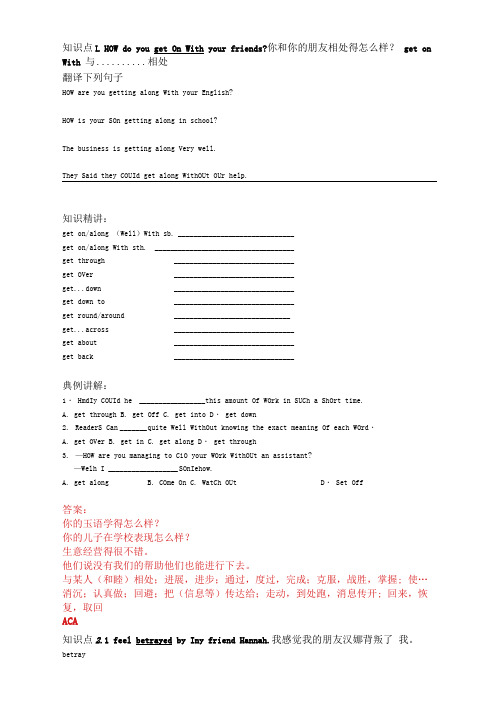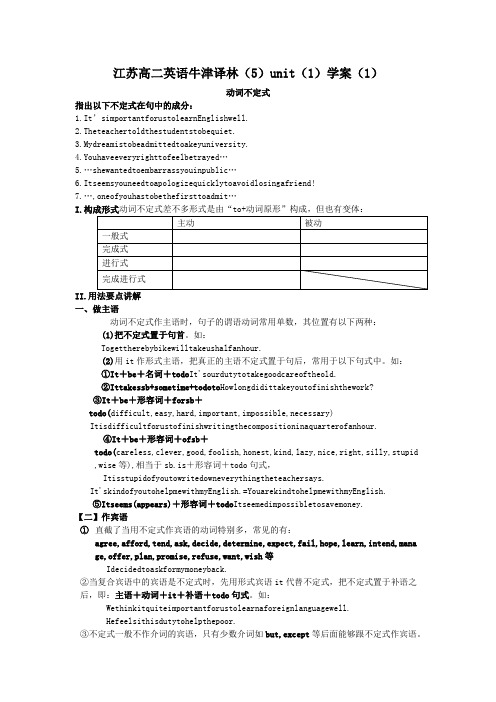高二英语牛津英语模块5unit1Task
高中英语 模块五 Unit1 Project课件 牛津版必修5

Discuss the tasks listed below and decide which group members will be responsible for the task. Write the names beside the work each member is going to do.
Answer any questions your classmates have about your survey or results. Post a copy of your survey and results on the display wall of your classroom.
Project Giving an Oral Report
Reading
What puzzles Robert? Some things about Amanda and her friends. (He can’t understand how girls can talk about for so long.)
Homework
Do Parts B1 and B2 on page 91 in Workbook. Do parts D1 and D2 on page 93 in workbook.
What’s the difference between girls and boys in their attitudes towards friendship? Girls always have a lot to talk about with their best friends and have more friendships than boys. Boys cannot name a single best friend.
苏教牛津译林高中英语模块5_苏教牛津译林高中英语模块5_Unit1_Word_power精品课件

2. take care (P9) (1)(口语)(分别时或信末)保重 Good-bye! Take care! 再见!多保重! (2)小心;当心
▶Take care on those steps! 小心那些台阶! ▶Take care not to drink too much! =Take care that you don’t drink too much! 当心别喝得太多!
▶His friends advised him to see a doctor, but he refused all of them. Who can persuade him? 他的朋友建议他去看医生,但他都拒绝了。谁能说服他?
Don’t let yourself _______ into buying
不定式作真正的主语。
Ⅱ. 难句剖析 1. Speaking of friends, I’ve met some nice people here in London and I think we might become close friends. (P9) 说起朋友,我在伦敦遇见一些很不错的人,我想我们也许 会成为好朋友。
Word power
Ⅰ. 词汇知识 1. stay up 熬夜;挺住 【原句】We stay up at night and talk about many things. (P7)我们谈天说地,聊到深夜。 ▶Tomorrow I should hand in a composition, so I will have
2. persuade vt. 说服,劝说;使相信 【原句】I’m so glad I have persuaded you to apologize to Rachel. (P9)我很高兴说服你向雷切尔道歉。
牛津译林版英语高二上学期英语必修五Unit1知识点梳理

知识点L HOW do you get On With your friends?你和你的朋友相处得怎么样?get on With 与.......... 相处翻译下列句子HOW are you getting along With your English?HOW is your SOn getting along in school?The business is getting along Very well.They Said they COUId get along WithOUt OUr help.知识精讲:get on/along (Well)With sb. ______________________________get on/along With sth. ____________________________________get through _______________________________get OVer _______________________________get...down _______________________________get down to _______________________________get round/around ______________________________get...across _______________________________get about _______________________________get back _______________________________典例讲解:1・ HmdIy COUId he _________________ t his amount Of WOrk in SUCh a ShOrt time.A. get throughB. get OffC. get into D・ get down2.ReaderS Can _______ q uite Well WithOut knowing the exact meaning Of each WOrd・A. get OVerB. get inC. get along D・ get through3.—HOW are you managing to CiO your WOrk WithOUt an assistant?—Welh I __________________ SOnIehow.A. get alongB. COme OnC. WatCh OUt D・ Set Off答案:你的玉语学得怎么样?你的儿子在学校表现怎么样?生意经营得很不错。
整合牛津译林版高中英语必修5 Unit 1 Task课件 共39张 精品

• 4. write a letter to each friend and explain how you are feeling; let them know you want the three of you to meet outside of school
• 5. write a letter, ask the two to meet at their favourite café on Saturday; talk and get to know each other better
• • Dear Annie, • Today, I found …
15 April
•… • Yours sincerely, • Li Dong
• Form the habit of
style vocabulaofreading
punctuation
grammar
handwriting spelling
Discuss and make up a dialogue.
• What does friendship mean to you? • What are the good qualities of a good friend? • How do you feel when you stay with your best
Task 1: correct a letter to agony aunt
• 1) 15 Apirl
April
• 2) my brother could get him ^
• 3) I’m not sure ifthtoattell Mum and Dad
• 4) …are almostw1h8e, bthuet rMum and Dad
高中英语 模块五 Unit1 Word Power课件 牛津版必修5

Positive generous reliable honest helpful polite friendly warm-hearted open-minded
Negative dishonest stubborn moody unkind impolite bபைடு நூலகம்ring narrow-minded bad-tempered
Han Fang’s cousin, Ding Wei, just started university. He is writing a letter to Han Fang to tell her all about the new friends he has made. Help him choose the proper adjectives to describe their personalities.
We get along very well because he is so _______ easy-going(difficult /easy-going). We stay up at night and talk about many things. We have interesting conversations. Neither of us is quiet (quiet /talkative), ____ that’s for sure! Next is my classmate, Li Xiang. His family is from Nanjing, just like ours.
Word Power
Brainstorming
Adjectives to describe people or things. The dialogue below shows some examples of how adjectives are used to describe people’s personalities. A: At first, when I saw my best friend start to spend time with new friends, I was jealous. But now I am more openminded because I have new friends to spend time too.
牛津高中英语模块五 Unit1 Task

Unit 1 Getting along with othersTask Writing a letter to a friend●Teaching objectives:1.understand a conversation on a radio talk show2.discuss friendship and practise agreeing and disagreeing3.write a letter to a friend4.learn and practise language skills of listening, reading, speaking and writing.●Teaching focus and difficulties:1.writing down answers2.the way to show agreeing and disagreeing.3.writing a letter to a friend●Teaching methods:1. Listening, reading and thinking to get students to understand the text.2. Pair discussion and group discussion to get students to participate in the classroom activities.●Teaching aids:The multimedia●Teaching procedures:Skills building 1: Writing down the answers1. Lead-inYou are a reporter of your school newspaper and going to have a interview with your headmaster next week, what should you do?2. Turn to page 12 and find some guidelinesa. Questions: Prepare them in advance.b. Notes: Brief notes only, not whole sentences.Make the notes which you can understand later.Use contractions and abbreviations if possible.c. Tip: Be polite when you ask others to repeat.I beg your pardon? / Pardon me?Could you say that again?Could you repeat that, please?Did you say… or…?3. Listeninga. Discuss freely:Have you ever moved to a new town or neighbourhood?What did you do when you meet your new neighbours?What did you talk about when you met your new neighbours for the first time?How did you make friends with your new neighbours?b.Listen to the radio programme and make notesnotes(fill in the blanks)1. What things might worry you when you move to a new place?Hot to find my way around, __________ and make new friends2. What is one way to meet new neighbours?Visit ___________ with a small gift3. What are some things you should do when you meet a person for the first time?Be _______________ about myself; ask him/her questions about himself/herself; listen to _______________________4. If you want to meet people with similar interests to yours, what can you do?Join a local club or _______________5. What are some things you should do if you want to make true friends?Always __________________ ; listen to what they have to say; ______________ myself and my feelingsStep 1 : Calling Teen Talk for advice1. Brainstorming:What do you do when you have a personal problem?Would you talk to your parents or your friends and ask them for advice? Have you ever called a radio programme for advice?2. Read the leaflet about Teen Talk and do the exercise in Part A3.Keys to Part ATeen talk1 You can read Teen Talk by:e-mail / phone / website.2 Teen Talk never closes. True False3 Teenagers’ problems wil l be reported to parents Ture False4 Teen Talk listen to _________________5 Teen Talk offers _______PhoneTrueFalseteenagers’ problemsadviceSkills building 2: agreeing and disagreeing1. Lead-inWhat do you often do with your friends?Have you ever write letters to your friends?It’s a waste of time to write to your friends every day, don’t you think so?2.a. AgreeingI agree with you on/that…I am of the same opinion (as…).Exactly.That’s a good point.That’s how I feel (about…) too.That’s right.You’ve got a point.Yes. And another reason is that…b. DisagreeingI don’t agree. What about…?I’m not sure that’s true.I see things slightly differently.On the other hand, …Perhaps you are mistaken.Really? I don’t think that…I take your point, but…That’s true, but…c. Tips:If you disagree with someone you should express your opinions politely.Others will take your opinions more seriously if you state them calmly and politely.3.Group work:express your opinions on the statements on page 14 by stating whether you agree or disagree, using the expressions just learned.Step 2: discussing friendship with others1. Look at the table of part A on page 15Have a discussion on friendship and asks your classmates at least three questions for their opinions on friendship.Note the responses in the table.2.Discussion (pair work)Discuss the following statements on friendship and decide whether you agree or disagree with them.Friendship is an important part of my life.A good friend must be honest, kind and have a sense of humour.One or two good friends are better than 100 acquaintances.Skills building 3: checking your work1.lead-inWhat should we check for?Read the points on page 16 and find the answers.2. In particular, we should check for:Facts: make sure the facts are accurate.Grammar: Check that you have used the correct tenses, parts of speech, sentence structures, etc. Make sure the verb agrees with the subject.Handwriting: Make sure your handwriting is clear.Punctuation: Check that all punctuation marks are used correctly and that none are missing.Vocabulary: Check that you have used the right words.Spelling: Look out for spelling mistakes.Style(formal/informal): Make sure that the choice of vocabulary and sentence structure matches the style of writing.3. Your friend Rebecca wrote about her twin brother in her diary. She asked you to check it for mistakes. There is one mistake in each line.15 Apirl Today, I found out something about my brother could get himinto a lot of trouble. I’m not sure if to tell Mum and Dad.Although William and I are almost 18, but Mum and Dad are stillquite strict to us. Recently, William has begun wearing some strangeclothes. and he looks quite different from before.The other day I saw him smoked in his room, with two of his friends,Jack and Sean. I know Mum and Dad would be extreme angry me if theyknew that I had kept this secret for them. Maybe I should tell them, so theywon’t blame me for keep a secret.However, I don’t think William will live at home for much longer as hesplanning to go to university soon, His grades are still good. It seemsthat his behaviour hasn’t hurt he studies. Maybe I should just keepmy month shut. What should I do?Step 3: Writing a letter to your friend1.Write a letter to a friend about what his or her friendship means to you. using information gathered in Step 1 and2.2.Group work: each member of the group contributes something to the planning of the outline of the letter.3. Write the letter based on the outline in Part A on page 17.Consider the suggestions carefullyyour feelings about friendshipthe qualities of a good friendyour feelings about best friendswhat makes a good friendship last4.PresentationLet’s invite several groups to read their letters to the classHomeworkFinish any additional exercisesPreview the Project。
江苏高二英语牛津译林(5)unit(1)学案(1)

江苏高二英语牛津译林(5)unit(1)学案(1)动词不定式指出以下不定式在句中的成分:1.It’simportantforustolearnEnglishwell.2.Theteachertoldthestudentstobequiet.3.Mydreamistobeadmittedtoakeyuniversity.4.Youhaveeveryrighttofeelbetrayed…5.…shewantedtoembarrassyouinpublic…6.Itseemsyouneedtoapologizequicklytoavoidlosingafriend!7.…,oneofyouhastobethefirsttoadmit…I.II.用法要点讲解一、做主语动词不定式作主语时,句子的谓语动词常用单数,其位置有以下两种:(1)把不定式置于句首。
如:Togettherebybikewilltakeushalfanhour.(2)用it作形式主语,把真正的主语不定式置于句后,常用于以下句式中。
如:①It+be+名词+todo It'sourdutytotakegoodcareoftheold.②Ittakessb+sometime+todoto Howlongdidittakeyoutofinishthework?③It+be+形容词+forsb+todo(difficult,easy,hard,important,impossible,necessary)Itisdifficultforustofinishwritingthecompositioninaquarterofanhour.④It+be+形容词+ofsb+todo(careless,clever,good,foolish,honest,kind,lazy,nice,right,silly,stupid ,wise等),相当于sb.is+形容词+todo句式,Itisstupidofyoutowritedowneverythingtheteachersays.It'skindofyoutohelpmewithmyEnglish.=YouarekindtohelpmewithmyEnglish.⑤Itseems(appears)+形容词+todo Itseemedimpossibletosavemoney.【二】作宾语①直截了当用不定式作宾语的动词特别多,常见的有:agree,afford,tend,ask,decide,determine,expect,fail,hope,learn,intend,mana ge,offer,plan,promise,refuse,want,wish等Idecidedtoaskformymoneyback.②当复合宾语中的宾语是不定式时,先用形式宾语it代替不定式,把不定式置于补语之后,即:主语+动词+it+补语+todo句式。
牛津高中英语 模块5 Unit 1 Getting along with others-新课标[原创] .ppt
![牛津高中英语 模块5 Unit 1 Getting along with others-新课标[原创] .ppt](https://img.taocdn.com/s3/m/24c3758b8762caaedd33d45c.png)
They both feel sad.
What did Sarah get for the surprise Maths test?
The lowest mark in the class.
Is Matthew usually a quiet boy?
ቤተ መጻሕፍቲ ባይዱ
5. What did Matthew think about losing the match?
Matthew thought that having lost the game was not his fault and that Andrew shouldn’t yell at him because he thought one couldn’t always give a great performance.
3. 4.
5.
Why did Sarah tell Hannah that they weren’t going to be
friends any more?
Why did Andrew shout at Matthew after the match
What did Matthew think about losing the match?
Lead in
Have you ever quarreled with your best friend? Why did you quarrel with each other? Who shouted at the other first? What did you do at that time? What was your mood at that time? Are you still friends?
- 1、下载文档前请自行甄别文档内容的完整性,平台不提供额外的编辑、内容补充、找答案等附加服务。
- 2、"仅部分预览"的文档,不可在线预览部分如存在完整性等问题,可反馈申请退款(可完整预览的文档不适用该条件!)。
- 3、如文档侵犯您的权益,请联系客服反馈,我们会尽快为您处理(人工客服工作时间:9:00-18:30)。
Unit 1 Getting along with othersTask Writing a letter to a friend●Teaching objectives:1.understand a conversation on a radio talk show2.discuss friendship and practise agreeing and disagreeing3.write a letter to a friend4.learn and practise language skills of listening, reading, speaking and writing.●Teaching focus and difficulties:1.writing down answers2.the way to show agreeing and disagreeing.3.writing a letter to a friend●Teaching methods:1. Listening, reading and thinking to get students to understand the text.2. Pair discussion and group discussion to get students to participate in the classroom activities.●Teaching aids:The multimedia●Teaching procedures:Skills building 1: Writing down the answers1. Lead-inYou are a reporter of your school newspaper and going to have a interview with your headmaster next week, what should you do?2. Turn to page 12 and find some guidelinesa. Questions: Prepare them in advance.b. Notes: Brief notes only, not whole sentences.Make the notes which you can understand later.Use contractions and abbreviations if possible.c. Tip: Be polite when you ask others to repeat.Could you say that again?Could you repeat that,please?Did you say ______ or ______?3. Listeninga. Discuss freely:Have you ever moved to a new town or neighbourhood?What did you do when you meet your new neighbours?What did you talk about when you met your new neighbours for the first time?How did you make friends with your new neighbours?b.Listen to the radio programme and make notesnotes(fill in the blanks)1) Things might worry you when you move to a new place.how to find your way round, meet new people, make friends.2) Ways to meet a new neighbour:visit their homes with __________ ;join a ________ or ___________3)some things you should do when you meet a person for the first time.be ____ and _____ about yourself;ask him/her ________ about _____________ ;actively _____________________ .4)You can ____________ or ___________ to meet a people with similar interests to you.5)tick the right answer:To make true friends, you shouldA.help them when you are freeB.always be there for themC.always be happy before themD.listen to what they have to sayE.be honest about yourself and your feelingsStep 1 : Calling Teen Talk for advice1. Brainstorming:What do you do when you have a personal problem?Would you talk to your parents or your friends and ask them for advice? Have you ever called a radio programme for advice?2. Read the leaflet about Teen Talk and do the exercise in Part A3.Keys to Part APhoneTrueFalseteenagers’ problemsadviceSkills building 2: agreeing and disagreeing1. Lead-inWhat do you often do with your friends?Have you ever write letters to your friends?It’s a waste of time to write to your friends every day, don’t you think so?2.a. AgreeingI ag ree with you on/that…I am of the same opinion (as…).Exactly.That’s a good point.That’s how I feel (about…) too.That’s right.You’ve got a point.Yes. And another reason is that…b. DisagreeingI don’t agree. What about…?I’m not sure that’s true.I see things slightly differently.On the other hand, …Perhaps you are mistaken.Really? I don’t think that…I take your point, but…That’s true, but…c. Tips:If you disagree with someone you should express your opinions politely.Others will take your opinions more seriously if you state them calmly and politely.3.Group work:express your opinions on the statements on page 14 by stating whether you agree or disagree, using the expressions just learned.Step 2: discussing friendship with others1. Look at the table of part A on page 15Have a discussion on friendship and asks your classmates at least three questions for their opinions on friendship.Note the responses in the table.2.Discussion (pair work)Discuss the following statements on friendship and decide whether you agree or disagree with them.Friendship is an important part of my life.A good friend must be honest, kind and have a sense of humour.One or two good friends are better than 100 acquaintances.Skills building 3: proofreading1.lead-inWhat is proofreading?(Finding careless mistakes that you have made.)What should we check for?Read the points on page 16 and find the answers.2. In particular, we should check for:Facts: make sure the facts are accurate.Grammar: Check that you have used the correct tenses, parts of speech, sentence structures, etc. Make sure the verb agrees with the subject.Handwriting:Make sure your handwriting is clear.Punctuation: Check that all punctuation marks are used correctly and that none are missing.Vocabulary:Check that you have used the right words.Spelling: Look out for spelling mistakes.Style(formal/informal):Check that the choice of vocabulary and sentence structure is of the right degree of formality.3. Your friend Rebecca wrote about her twin brother in her diary. She asked you to check it for mistakes. There is one mistake in each line.15 Apirl Today, I found out something about my brother could get himinto a lot of trouble. I’m not sure if to tell Mum and Dad.Although William and I are almost 18, but Mum and Dad are stillquite stricte with us. Recently, William has begun wearing some strangeclothes. He always wears big boot and a leather jacket, and helooks quite different from before.The other day I saw him smoked in his room, with two of his friends,Jack and Sean. I know Mum and Dad would be extreme angry if theyknew about it. They’d also be angry me if they knew that I had kept thissecret for them. Maybe I should tell them, so they won’t blame me forkeep a secret.However, I don’t think William will live at home for much longer as hesplanning to go to university soon, His grades are still good. It seemsthat his behaviour hasn’t had some effect on his schoolwork. Maybe IShould just keep my month shut. What should I do?Step 3: Writing a letter to your friend1.Write a letter to a friend about what his or her friendship means to you. using information gathered in Step 1 and2.2.Group work: each member of the group contributes something to the planning of the outline of the letter.3. Write the letter based on the outline in Part A on page 17.Consider the suggestions carefullyyour feelings about friendshipthe qualities of a good friendyour feelings about best friendswhat makes a good friendship last4.PresentationLet’s invite several groups to read their letters to the classHomeworkFinish any additional exercisesPreview the Project。
